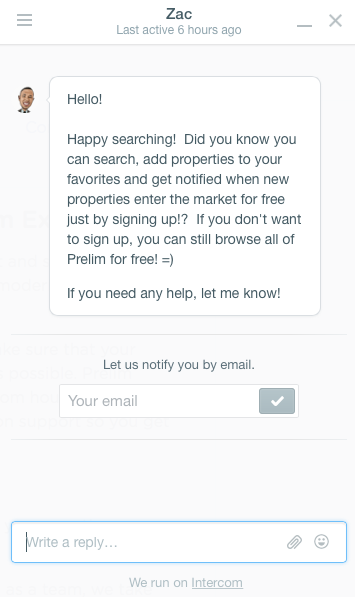Zac Harris, the founder and CEO of Prelim — a tech-focused real estate service — knows that buying a home can be a massive undertaking. He purchased his first home last October, and he describes the process as “a huge headache.”
“There was so much paperwork and back-and-forth,” he said. “But I felt like I did a lot of the groundwork myself. The agent made a good commission, but he hardly did any work. Today, potential homebuyers find out a lot of information in advance from websites like Zillow. Why are agents still charging a 6% commission most of the time when they’re only doing half the work?”
 Prelim, Harris’s new venture, sets out to solve that problem. He describes Prelim as a “real estate brokerage with tech components.” The website handles every aspect of real estate transactions, from helping buyers get preapproved to executing contracts. Buyers can use the website to save homes they like, book viewings online, and even schedule virtual walkthroughs via Skype or Periscope if they’re moving to Champaign County from another area. Sellers, meanwhile, can use the site to see and evaluate every offer on their home.
Prelim, Harris’s new venture, sets out to solve that problem. He describes Prelim as a “real estate brokerage with tech components.” The website handles every aspect of real estate transactions, from helping buyers get preapproved to executing contracts. Buyers can use the website to save homes they like, book viewings online, and even schedule virtual walkthroughs via Skype or Periscope if they’re moving to Champaign County from another area. Sellers, meanwhile, can use the site to see and evaluate every offer on their home.
“Real estate is not a very transparent industry,” said Harris. “Part of the goal of Prelim is to give people updates as soon as things happen.”
Prelim’s tech components are designed to put the customer in the driver’s seat as well as to save money. According to Harris, Prelim’s efficiency makes it possible for all buyers who work with the site to get a rebate of 1% off the purchase price of a home.
 Harris has seen the inefficiency of real estate from the inside. His previous company, RealtySumo, developed software for real estate agents. But Harris found that many real estate agents aren’t motivated to work with new software. This resistance, in Harris’s view, slows down the real estate market, especially in tech-savvy communities like Champaign-Urbana.
Harris has seen the inefficiency of real estate from the inside. His previous company, RealtySumo, developed software for real estate agents. But Harris found that many real estate agents aren’t motivated to work with new software. This resistance, in Harris’s view, slows down the real estate market, especially in tech-savvy communities like Champaign-Urbana.
“The real estate market in Champaign-Urbana is very slow,” said Harris. “Most realtors have a very old-school approach: you’ll see lots of realtors spending all this time making phone calls, or possibly sending email updates, though those often look eight years old.”
Harris notes that buyers today use sites like Zillow to find and research homes, but then they have to turn to a traditional real estate agent to finish the process.
“Some first-time home buyers think they can actually buy a home on Zillow,” said Harris, “but, unlike Prelim, Zillow is just a search portal. One of Prelim’s goals is to educate people about the real estate market and what the steps are for buying or selling a home.”
Harris has always been oriented toward entrepreneurship. “I’m a big risk-taker,” he said, “and that translates perfectly to entrepreneurship.” He said he became “addicted” to his first company, an ecommerce site with a simple platform.
“It’s like watching a child grow up,” he said. “Now I have a two-year-old, so that’s what I relate it to. You watch it develop and you become happy with your creations.”
He thinks the role of entrepreneurs is to solve problems. “I always start by asking myself about the problems I face first-hand,” he said. “I learned a lot about the sluggishness of the real estate industry when I worked with RealtySumo, and then I saw it from a different perspective when I bought my home. With my businesses, I don’t make guesses; I start where I know the problems are. If I haven’t experienced something, I can’t create a solution for it.”
Now well into Prelim, Harris said that Champaign-Urbana is an ideal place to start a tech company and to take risks.
“Champaign-Urbana is a great place to start a company because the community is so involved in what’s going on here,” said Harris. “When I moved here five years ago, I was actually shocked by the depth of the community in C-U. And, of course, having the University of Illinois and Research Park here is invaluable. Both cities really support entrepreneurship, and there are lots of opportunities to meet other entrepreneurial people in C-U.”
The challenge to starting a company like Prelim in C-U, according to Harris, is that the company has to do a lot of legwork in terms of building community trust.
“This is a tight-knit community,” said Harris, “and many people in business circles know each other. Some realtors see us as a threat, and some lenders have been working with the same brokers for a very long time. We need to spend time convincing the community that we’re not a fly-by-night company. We’re not from out of state; our offices are in Urbana. We care about this market. That’s why we’re here.”








